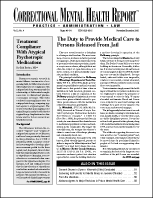Prospects for Correctional Mental Health Litigation
Author: Terry A. Kupers.
Source: Volume 21, Number 04, November/December 2019 , pp.51-53(3)

< previous article |next article > |return to table of contents
Abstract:
Terry A. Kupers is a Professor at The Wright Institute and author most recently of “Solitary: The Inside Story of Supermax Isolation and How We Can Abolish It” (U of CA Press, 2017). He is widely consulted on a variety of correctional mental health issues. In this article, Professor Kupers looks at a phenomenon all too familiar to successful litigants in correctional mental health suits—the temporary and diminishing impact of successful class action lawsuits when not accompanied by long-term and consistent outside monitoring. Just after the trial, there is typically a period where mental health services improve—a more adequate suicide screening policy, or a strict limit to the amount of time a prisoner with serious mental illness can be consigned to solitary confinement. But then there are regressions, often the result of budget reductions for correctional mental health. A return visit five years after a successful class action lawsuit can show a system minimally changed by the huge and expensive legal effort. Attorneys agree that the best way to guarantee ongoing positive reforms is to write extended monitoring and other forms of oversight into legal agreements.Keywords: Short- and Long-term Impact of Conditions Litigation
Affiliations:
1: Wright Institute.